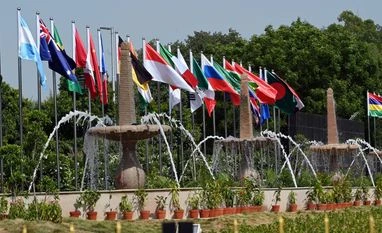By Alex Wickham, Ruchi Bhatia and Alberto Nardelli
China is emerging as a block on negotiations in the run-up to a meeting of Group of 20 leaders, with the UK accusing Beijing of obstructing measures to tackle climate change and refusing to back language condemning Russia’s war on Ukraine.
UK Prime Minister Rishi Sunak said that with China objecting to proposals on Ukraine and climate, G—20 nations had yet to reach agreement on a joint statement for two-day summit in New Delhi.
“We’re not there yet,” Sunak told Bloomberg News on the plane to India. Those two topics, climate and Ukraine, will dominate discussions over the weekend, Sunak added, describing negotiations between government officials so far as “challenging.”
Chinese President Xi Jinping decided to skip the G-20 amid deteriorating relations with both the US and the summit host, India. Officials from Beijing are still actively involved in the deliberations aimed at reaching agreement on global challenges from development financing to food security.
Talks are ongoing and habitually entail last-minute compromise to reach a consensus. However, officials say this year’s negotiations are especially intense.
More From This Section
In the discussions on climate action, China has also raised the issue of access to semiconductor technology to help emerging economies transition to clean energy, people familiar with the talks said. That serves to highlight its complaints over wide-ranging export controls that Washington has imposed on US chip tech to China on national security grounds.
Peak emissions
Still, Beijing is not alone in digging in on certain climate proposals. Efforts by the European participants among others to set a target for global emissions to peak of not later than 2025 are being blocked by Russia, Saudi Arabia and South Africa as well as China, according to two people with knowledge of the negotiations. Russia and Saudi Arabia are also opposed to language on accelerating efforts toward the phase down or phase out of unabated fossil fuel use, the people said.
“You have to recognize the G-20 is different to the G-7,” said Sunak.
An Indian official said separately that China is reluctant to include climate safeguards in the debt restructuring plan for vulnerable nations that is to be discussed in New Delhi, with Beijing pushing back against the US and India.
The frictions are emerging ahead of the United Nations climate summit, COP28, which is being held later this year by Saudi Arabia’s close ally, the United Arab Emirates.
Germany is among G-20 nations pressing for concrete progress on climate protection with new goals including specific dates for emissions to peak, as well as unambiguous language on Russia’s war.
Bigger BRICS
The reference point is last year’s G-20 summit in Bali, Indonesia, when leaders managed to produce a joint statement on both issues. Since then, however, US-China ties have continued to spiral while the BRICS grouping of Brazil, Russia, India, China and South Africa agreed to expand the club to 11 members, in a sign of resistance to the US-led world order epitomized by the G-7.
Sunak said the UK would “continue to make the case” to China that “what Russia is doing is wrong, and why it’s right to support Ukraine, particularly when it comes to food security.” Britain would also use negotiations over the weekend to make sure G-20 nations “continue to meet their climate commitments,” he said.
Sunak signaled that he wanted China to commit to the same form of words on Ukraine and climate change that was agreed at the last G-20 summit. The G-20 “worked really hard at Bali” to come to an agreement, he said.
)